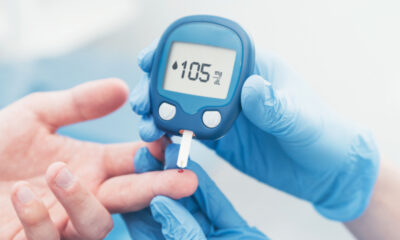Diabetology
Blood Sugar Basics: How Diabetes Affects Your Body
Published
2 years agoon
By
Robert
Blood sugar, also known as blood glucose, is the primary fuel that keeps your body running. It comes from the carbohydrates you consume, and your body meticulously regulates its levels to ensure optimal functioning. However, when this system goes awry, a condition called diabetes develops. This article delves into the fundamentals of blood sugar, explores how diabetes disrupts it, and unveils the consequences on your body.
Understanding Blood Sugar
- The Role of Glucose: Glucose, a simple sugar, is the energy currency for your cells. After you eat, carbohydrates break down into glucose, which enters your bloodstream.
- Insulin: The Key Player: The pancreas, a gland behind your stomach, produces insulin, a hormone crucial for blood sugar management. Insulin acts like a key, unlocking the doors of your cells and allowing glucose to enter for energy production.
- Maintaining Balance: Your body maintains a tight balance of blood sugar levels. After eating, levels rise, prompting the pancreas to release insulin. The extra glucose gets absorbed by cells, and blood sugar levels return to normal.
Types of Diabetes and Their Impact
There are three main types of diabetes:
- Type 1 Diabetes: In type 1 diabetes, the body’s immune system attacks the insulin-producing cells in the pancreas, resulting in little to no insulin production. This disrupts the blood sugar entry into cells, leading to high blood sugar levels.
- Type 2 Diabetes: This is the most common form. In type 2 diabetes, the body either develops insulin resistance (cells become less responsive to insulin) or has insufficient insulin production. The consequence is again high blood sugar.
- Gestational Diabetes: This type of diabetes develops during pregnancy due to hormonal changes. It usually resolves after childbirth but increases the risk of developing type 2 diabetes later in life.
How Diabetes Affects Your Body: A Multifaceted Disruption
When diabetes is left unmanaged, chronically high blood sugar levels wreak havoc on your body, causing a domino effect of complications. Here’s a breakdown of how different systems are impacted:
- Cardiovascular System: Chronically high blood sugar damages blood vessel walls, leading to hardening and narrowing (atherosclerosis). This increases the risk of heart attack, stroke, and peripheral artery disease (PAD).
- Nervous System: Elevated blood sugar levels can damage nerves throughout the body, leading to diabetic neuropathy. Symptoms include tingling, numbness, pain, and weakness, often starting in the feet and hands.
- Eyes: Diabetes is a leading cause of blindness. High blood sugar damages the delicate blood vessels in the retina (diabetic retinopathy), which can lead to vision loss and blindness if left untreated.
- Kidneys: Diabetes can damage the tiny blood vessels in the kidneys (diabetic nephropathy), impairing their ability to filter waste products from the blood. This can eventually lead to kidney failure.
- Skin: People with diabetes are more prone to skin infections, slow wound healing, and diabetic foot ulcers due to impaired circulation and nerve damage.
- Reproductive System: Diabetes can affect sexual function in both men and women, leading to erectile dysfunction, decreased libido, and vaginal dryness.
Symptoms and Early Detection
While symptoms can vary depending on the type and severity of diabetes, some common warning signs include:
- Excessive thirst and urination
- Increased hunger
- Unintended weight loss
- Fatigue and lack of energy
- Blurred vision
- Slow-healing wounds
- Frequent infections
Early detection is crucial to prevent or delay complications. Regular blood sugar checks are vital, especially for those at high risk.
Living with Diabetes: Management Strategies
Fortunately, diabetes is a manageable condition. Here are key strategies for individuals with diabetes:
- Diet and Exercise: A healthy diet with balanced carbohydrates, lean protein, and healthy fats plays a crucial role. Regular physical activity helps improve insulin sensitivity and blood sugar control.
- Medications: Depending on the type and severity of diabetes, medications like insulin or oral medications may be prescribed to regulate blood sugar levels.
- Blood Sugar Monitoring: Regularly monitoring blood sugar levels at home allows for adjustments in diet, medication, or activity as needed.
- Stress Management: Chronic stress can elevate blood sugar levels. Techniques like meditation, yoga, and deep breathing can be helpful.
- Regular Doctor Visits: Regular checkups with your doctor are essential to monitor blood sugar levels, assess for complications, and adjust treatment plans as needed.
Living a Fulfilling Life with Diabetes
While diabetes requires ongoing management, it doesn’t have to limit your life. By taking charge of your health, adopting healthy habits, and working closely with your healthcare team, you can live a long and fulfilling life.
Additional Considerations
The Emotional Impact of Diabetes
Living with a chronic condition like diabetes can take an emotional toll. Here are some common challenges and ways to cope:
- Denial and Anger: The initial diagnosis can be overwhelming, leading to denial or anger.
- Fear and Anxiety: The fear of complications and the unknown can cause anxiety.
- Frustration and Discouragement: Managing diabetes requires constant vigilance, which can be frustrating, leading to discouragement.
- Depression: Feeling overwhelmed, isolated, or hopeless can contribute to depression.
Coping Strategies:
- Education: Learning about diabetes and its management empowers you to take control.
- Support Groups: Connecting with others who understand the challenges can be invaluable.
- Therapy: Talking to a therapist can help develop coping mechanisms and address emotional distress.
- Building a Strong Healthcare Team: Having a supportive doctor, diabetes educator, and mental health professional can provide holistic care.
Living a Balanced Life with Diabetes
Here are some additional tips to promote a healthy and fulfilling life with diabetes:
- Focus on Progress, Not Perfection: Aim for gradual improvements, not drastic changes. Celebrate small victories.
- Prioritize Sleep: Adequate sleep is crucial for overall health and blood sugar management.
- Get Regular Vaccinations: People with diabetes are more susceptible to infections, so staying up-to-date on vaccinations is essential.
- Foot Care: Daily foot checks, proper hygiene, and wearing comfortable shoes are vital to prevent diabetic foot ulcers.
- Dental Care: Diabetes increases the risk of gum disease and other dental problems. Regular dental checkups and good oral hygiene are essential.
- Financial Planning: Diabetes management can involve additional expenses. Explore financial assistance programs and plan for future healthcare costs.
- Travel Tips: Plan ahead for managing blood sugar, medications, and supplies while traveling.
- Staying Active: Find physical activities you enjoy, like walking, swimming, or dancing.
The Future of Diabetes Management
Research in diabetes management is constantly evolving. Here are some promising advancements:
- Continuous Glucose Monitoring (CGM): These devices provide real-time blood sugar data, allowing for better management and preventing complications.
- Artificial Pancreas Systems: These closed-loop systems automatically adjust insulin delivery based on continuous blood sugar readings.
- Stem Cell Therapy: Research suggests potential for regenerating insulin-producing cells in the pancreas.
- Bioartificial Pancreas: These devices could mimic the function of a healthy pancreas by providing insulin on demand.
Conclusion
Diabetes, while a chronic condition, doesn’t have to define your life. By understanding how it affects your body, adopting healthy habits, managing your blood sugar, and seeking support when needed, you can live a long and fulfilling life. Remember, you’re not alone on this journey. With knowledge, commitment, and the right support system, you can thrive with diabetes.
Note: This information is intended for general knowledge and shouldn’t be a substitute for professional medical advice. Always consult your doctor for diagnosis, treatment, and personalized management of diabetes.
You may like
-


Difference Between Type 1 and Type 2 Diabetes: Symptoms, Causes & Treatment Explained
-


Healthy Habits That Lower Your Risk of Diabetes
-


Best Diet Plan for Diabetes Management in 2026
-


Global Demand for Oral Hypoglycemics Surges Amid Rising Diabetes Cases
-


Best Low-Glycemic Sweeteners for Diabetics: A Healthier Choice
-


Morning Routine for Diabetics: Simple Steps to Stabilize Blood Sugar
The Latest News
- Difference Between Type 1 and Type 2 Diabetes: Symptoms, Causes & Treatment Explained
- Healthy Habits That Lower Your Risk of Diabetes
- Best Diet Plan for Diabetes Management in 2026
- Med Matrix Debuts Free Podcast Series Focused on Root-Cause Medicine
- Diabetic Meal Plan: Eat Smart to Manage Your Blood Sugar
- Global Demand for Oral Hypoglycemics Surges Amid Rising Diabetes Cases
- Lifestyle Changes Proven to Improve Blood Sugar Levels

Difference Between Type 1 and Type 2 Diabetes: Symptoms, Causes & Treatment Explained

Healthy Habits That Lower Your Risk of Diabetes

Best Diet Plan for Diabetes Management in 2026

Lung growth invading Treg have different transcriptional profiles and capability connected to designated spot bar reaction

Psoriasis be treatment by adjuvant Salicylic acid, ceramides as this containing lotions

